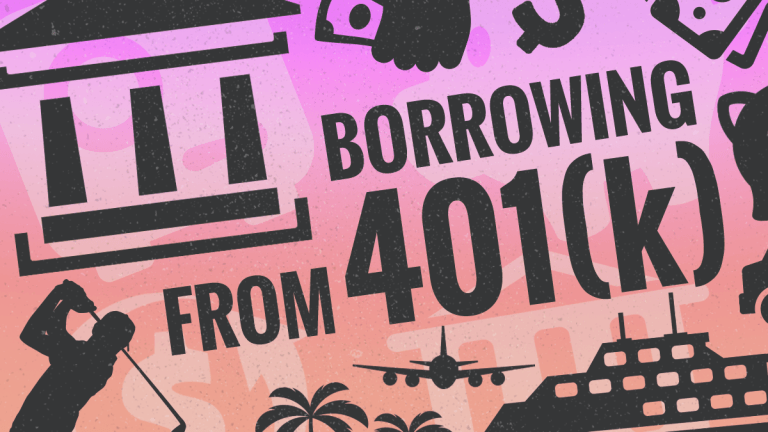Briefly taking cash from your 401(k) can be a reasonable approach to get to a lot of money with generally little issue rapidly. In any case, it’s not without risk.
Assuming you’re imprudent or need a long time to reimburse the cash, getting from your workplace retirement record can crash both your short-and long haul funds.
So before you plunge into your retirement asset and abandon an IOU, this is the thing you want to be aware of.
How a 401(k) credit works
Numerous 401(k) retirement plans permit you to acquire up to $50,000 or a big part of your equilibrium tax-exempt, whichever is less. Assuming that your surplus is underneath $10,000, you’re permitted to get everything.
For instance, on the off chance that you have a $60,000 total, you could get $30,000 — the lesser of half of your surplus and $50,000. If your 401(k) surplus is $150,000, you could get to $50,000.
Remember, these numbers allude to your “vested” balance. Reserves contributed by your manager may not be completely open to you — that is, vested — for a while, contingent upon your arrangement.
These withdrawals are ordinarily called 401(k) credits, however since there is no moneylender included, they’re in fact not advances. Rather, it’s a technique to take advantage of a lump of your retirement investment funds tax-exempt before you arrive at retirement age.
While your arrangement might expect you to pay a “premium,” all of that additional cash simply returns to your own retirement account. The point is basically to return your record equilibrium to the state it would have been in had you not removed the cash and on second thought permitted your equilibrium to develop.
No credit check is required, however, you might need to pay an unobtrusive start or managerial charge. You normally need to reimburse your “advance” in somewhere around five years, making booked installments in some measure each quarter. There are a few exemptions, as on the off chance that you utilize the cash to purchase another main living place.
On the off chance that you neglect to supplant the cash you pulled out, the IRS regards your withdrawal as an ordinary conveyance and smacks you with heavy punishments. You’ll need to pay personal duty on the credit, in addition to a 10% early circulation charge in the event that you’re under age 59 ½.
Getting from 401(k) advantages and disadvantages
Before you get from your 401(k), it’s essential to see every one of the benefits and drawbacks contrasted with different sorts of credits.
Masters
Quick funding. It can require between a day and half a month to accept your cash. This relies upon your arrangement and company, however, online solicitations are much of the time expedient.
Helpful. No requirement for advance shopping, demonstrating your financial soundness, or bothering with moneylenders.
Adaptable. Reimbursement terms are frequently adaptable to the same length as you make your base quarterly installments and reimburse everything in five years or less.
Low interest. Regardless of whether you think about it like conventional interest, you’ll pay not exactly greater expense acquiring options like Mastercards, payday advances, and, surprisingly, numerous individual advances in the event that you don’t have heavenly credit.
Potential investment funds help. At the point when you get from a 401(k), you are really selling a portion of your ventures. In the event that the market is declining, you may really outpace the competition when you repurchase.
Cons
Less compounding. You lose the influence of tax-exempt intensifying on the cash you get for the timeframe that you get it. Likewise, a few plans may not allow you to contribute new cash for a specific period, including boss-matched commitments.
Charge failures. Ordinary 401(k) commitments are charge conceded, however, the “premium” bits of your 401(k) credit reimbursements are made with after-charge dollars. You will, essentially, be burdened two times on that cash.
Hazard of missing cutoff times. In the event that life rattles and you can’t reimburse your credit on time, you’ll settle additional expenses and psychologist your retirement fund.
Stayed with your work. Assuming you leave your manager under any condition — even reluctantly — you should reimburse your credit before your expense form for the ongoing year is expected.
To decide whether a 401(k) seems OK, you need to consider all the open door costs.
When a 401(k) credit is brilliant (and when it’s not)
Exploiting a 401(k) credit can seem OK when you really want crisis momentary money and don’t have better fluid choices.
You have five years to repay it, yet it’s more secure to take a more modest credit that you’re ready to repay in no less than a year or less. That way you won’t miss as much time on the lookout, and you’re less inclined to infringe on the five-year cutoff.
For instance, getting from your 401(k) could seem OK to take care of a powerful equilibrium on an exorbitant premium charge card, expecting you can reimburse the cash rapidly.
In any case, this is particularly obvious in a down market when your 401(k) isn’t developing much. As a rule, not a smart thought to time the market. Be that as it may, on the off chance that you’re in a downturn seemingly forever, you could hypothetically get from and reimburse your 401(k) before the market returns.
Be that as it may, regardless of whether the market is down, it doesn’t give you a free pass to get for some unacceptable reasons.
Treating your 401(k) as a financial record won’t possibly jeopardize your retirement reserve funds on the off chance that you miss a cutoff time, however, you’ll pass up building profit, get twofold burdened on your advantage, and possibly lose your boss commitments.


